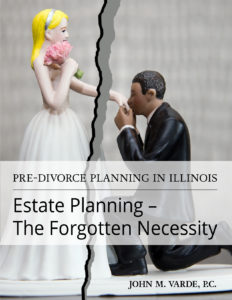Pre-Divorce Planning in Illinois

Estate Planning – The Forgotten Necessity
An important, but usually overlooked, aspect of pre-divorce planning is modifying (or perhaps creating) your estate planning documents to correspond with your current situation. The failure to do so during your pre-divorce planning can have disastrous results.
Picture this . . .
You are in the middle of a nasty, hard-fought divorce. You are on your way home from the store, singing along with a song on the radio. Out of the blue, some bozo runs a red light and smashes into you, sending your car flying across the intersection, into a light pole.
You end up in the hospital, unconscious, perhaps in a coma. There are many medical issues concerning your care that need to be quickly addressed and resolved. But . . . you’re unconscious and can’t speak with the doctors. So what happens?
If you haven’t updated your estate planning, most likely your spouse will be in charge of directing your medical care. That person who you’re trying desperately to get rid of will be making decisions about whether you live or die. Really.
If you have a Power of Attorney for Health Care, it probably appoints your spouse as agent to make medical decisions for you, including decisions about life-sustaining treatments. Even if the Power of Attorney is old, and even if you’re in the middle of a divorce, it’s still effective. If you don’t have a Power of Attorney, your spouse probably has the priority to make decisions for you under the Illinois Health Care Surrogate Act.
So how do you avoid this terrible result?
It’s easy. As part of your pre-divorce planning, you should collect and review your existing estate planning documents. Then, you need to get a new estate planning attorney, and modify the documents as appropriate. You need to replace the current fiduciaries and decision-makers (your spouse and his/her relatives) with people who you trust and who will be part of your post-divorce life. In addition, you need to modify the beneficiaries under your Will, revocable trust, and payable-on-death accounts to make sure that your family is protected.
If you don’t have any existing estate planning documents, it’s still easy to protect yourself. Just find an independent estate planner and discuss why you need the documents and what you want to accomplish. It’s a great first step in taking control of the rest of your life.
It is recommended that you consider these suggestions before you file for divorce. Once you are before the divorce court, there may be limitations and restrictions on the changes you can make, especially with respect to your properties. As soon as you have made the decision to proceed with your divorce, you should discuss these suggestions with your estate planning attorney and your divorce attorney.
A revocable trust is uniquely able to keep your spouse out of your affairs.
Estate planning and an on-going divorce intersect in two specific situations. First, if you become incapacitated due to illness or injury during your divorce; and second, if you die before your divorce is finalized.
Presumably, your goal is the same in both situations: you want to protect yourself and your family. You want protection from your spouse interjecting himself into your affairs and from taking control of your property.
In addition to the traditional estate planning uses, a funded revocable trust is a great tool for protecting your family, and for maintaining control over your future, as you move forward with your decision to get a divorce and start a new life.
INCAPACITY
If you become incapacitated, your revocable trust has a built-in mechanism for your selected successor to take over and manage your financial affairs. The transfer of control to your successor trustee is a time-honored transition, and generally, the use of a trust is more accepted than the use of a power of attorney for property.DEATH
If you die in the middle of your divorce, the court will terminate your divorce proceedings. In that case, your spouse will be treated as your “surviving spouse” under the law, and will inherit from you the same as if the divorce was never filed.If you die without estate planning, your surviving spouse will receive all or a significant portion of your assets.
If you die with a Will that was created before your divorce, your Will will probably give everything to your surviving spouse.
Even if you changed your Will and left your spouse nothing, your spouse may still receive a large share of your property. Many people are only vaguely aware that there are certain “statutory benefits” attached to a marriage. Under the Illinois Probate Act, your surviving spouse will be entitled to a “Spouse’s Award,” to “renounce your Will,” and to receive a significant portion of your probate estate.
A funded revocable trust is the only way to limit what your spouse will receive if you die before the divorce is final.
If you create a revocable trust that protects your family and excludes your spouse, and if you “fund” the trust by transferring your assets into it, then you have a court-approved method to limit your spouse’s claim to your property.
You have a right to direct where your “nonmarital” property goes after your death. In Illinois, to the extent that your nonmarital property is held in your revocable trust, there are very few limitations on who you can leave your property to. There is no legal requirement that you leave any of your nonmarital property in your trust to your spouse.
If your revocable trust is named as beneficiary of your life insurance, your “payable on death” accounts, your IRAs, or your bank and brokerage accounts, those assets will be transferred to your trust beneficiaries after your death, not to your spouse.
Further, Illinois is one of a few states that allows you to use a revocable trust to defeat your spouse’s “statutory benefits,” if you die before your divorce is final. The statutory benefits are based on and paid from the deceased spouse’s “probate estate.” However, assets that have been transferred to a revocable trust are not part of your probate estate, and cannot be used to pay your surviving spouse’s statutory benefits. The Illinois Supreme Court has held that, as long as the transfer was not a sham or illusory, an asset can be transferred to a revocable trust, even though it limits the surviving spouse’s rights to such property.
If you’re ready for divorce, you need to consider modifying your estate planning before you file your divorce papers.
WARNING. You may be tempted to try to take some of the suggestions in this post by yourself. Please be advised that estate planning is a complex legal field. It is strongly advised that you do not try to modify or create your estate planning as a “do-it-yourself” project. It is well worth your time and money to hire an experienced estate planning attorney.
A second piece of advice: Don’t hire an estate planning lawyer to do your divorce, and don’t hire a divorce attorney to do your estate planning. You need them both.
I have prepared an e-book that delves deeply into how you can protect yourself and your family called “Pre-Divorce Planning in Illinois, Estate Planning – The Forgotten Necessity”. The book provides a detailed discussion of the interactions between estate planning and divorce, and presents certain techniques to protect yourself and your family.
The e-book includes information about:
a. The importance of updating your estate planning as part of your pre-divorce planning
b. What’s in a basic estate plan
c. Why you can’t use your prior estate planning attorney
d. How to defeat your spouse’s “statutory benefits”
e. What types of changes should be made
f. Suggestions for specific changes to your estate plan
g. Changes to your jointly-owned property
h. How to protect your individually-owned properties and assetsIf you’d like more information or to purchase this valuable resource, please click the button below, which will transfer you to the publisher’s website, LeanPub.com.
DISCLAIMER:
This post is a general discussion of certain estate planning principles and techniques in Illinois and is provided solely for informational purposes. The content of this post and the related e-book is not intended to provide legal advice or tax advice in any situation.
Estate planning and divorce involve complex questions of law and can be very fact-dependent. This post and the related e-book cannot replace the advice of a licensed professional in your jurisdiction regarding your specific legal or tax situation. You should not act in response to the information contained on this website without first obtaining the opinion of a licensed professional. John M. Varde, P.C. and Schofield & Varde, LLP disclaim any liability for any act taken by you based on the information provided in this post or on this website.
The publication and reading of this post does not create an attorney-client relationship between you and John M. Varde, P.C. or Schofield & Varde, LLP. An attorney-client relationship will not be established until you have entered into a written engagement agreement with John M. Varde, P.C. or Schofield & Varde, LLP, and complied with the terms thereof.
John M. Varde, P.C. is licensed to practice law only in the state of Illinois, and practices primarily in Cook County, Illinois. The laws regarding estate planning and divorce vary from state to state. The information contained in this post is not applicable to any state other than Illinois. You must consult with an attorney licensed in your jurisdiction regarding your situation.
Categories: Estate Planning
We love them like family! It’s Time to Protect Yourself: Illinois Sets the Rules about Digital Assets.
Contact John
30+ Years Experience.
Personal Planning.
Plain English.

Committed to simplifying your estate planning. Let's work together to achieve your
peace of mind.
John Varde, Attorney
180 North LaSalle, Suite 2650
Chicago, Illinois 60601
Get Started Today
If you’re ready to take the next step, download the free Confidential Estate Planning Questionnaire



